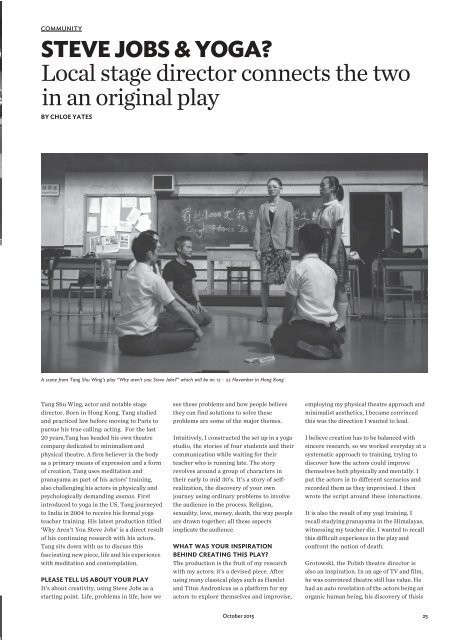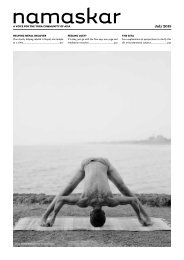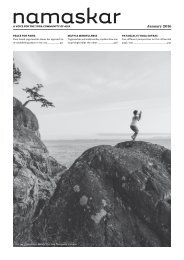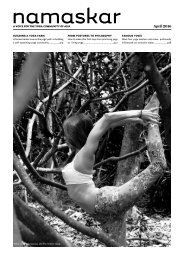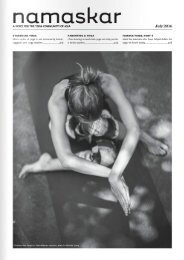Namaskar Oct 2015
You also want an ePaper? Increase the reach of your titles
YUMPU automatically turns print PDFs into web optimized ePapers that Google loves.
COMMUNITY<br />
STEVE JOBS & YOGA?<br />
Local stage director connects the two<br />
in an original play<br />
BY CHLOE YATES<br />
A scene from Tang Shu Wing’s play “Why aren’t you Steve Jobs?” which will be on 12 - 22 November in Hong Kong<br />
Tang Shu Wing, actor and notable stage<br />
director. Born in Hong Kong, Tang studied<br />
and practiced law before moving to Paris to<br />
pursue his true calling: acting. For the last<br />
20 years,Tang has headed his own theatre<br />
company dedicated to minimalism and<br />
physical theatre. A firm believer in the body<br />
as a primary means of expression and a form<br />
of creation, Tang uses meditation and<br />
pranayama as part of his actors’ training,<br />
also challenging his actors in physically and<br />
psychologically demanding asanas. First<br />
introduced to yoga in the US, Tang journeyed<br />
to India in 2004 to receive his formal yoga<br />
teacher training. His latest production titled<br />
‘Why Aren’t You Steve Jobs’ is a direct result<br />
of his continuing research with his actors.<br />
Tang sits down with us to discuss this<br />
fascinating new piece, life and his experience<br />
with meditation and contemplation.<br />
PLEASE TELL US ABOUT YOUR PLAY<br />
It’s about creativity, using Steve Jobs as a<br />
starting point. Life, problems in life, how we<br />
see these problems and how people believe<br />
they can find solutions to solve these<br />
problems are some of the major themes.<br />
Intuitively, I constructed the set up in a yoga<br />
studio, the stories of four students and their<br />
communication while waiting for their<br />
teacher who is running late. The story<br />
revolves around a group of characters in<br />
their early to mid 30’s. It’s a story of selfrealization,<br />
the discovery of your own<br />
journey using ordinary problems to involve<br />
the audience in the process. Religion,<br />
sexuality, love, money, death, the way people<br />
are drawn together; all these aspects<br />
implicate the audience.<br />
WHAT WAS YOUR INSPIRATION<br />
BEHIND CREATING THIS PLAY?<br />
The production is the fruit of my research<br />
with my actors; it’s a devised piece. After<br />
using many classical plays such as Hamlet<br />
and Titus Andronicus as a platform for my<br />
actors to explore themselves and improvise,<br />
employing my physical theatre approach and<br />
minimalist aesthetics, I became convinced<br />
this was the direction I wanted to lead.<br />
I believe creation has to be balanced with<br />
sincere research, so we worked everyday at a<br />
systematic approach to training, trying to<br />
discover how the actors could improve<br />
themselves both physically and mentally. I<br />
put the actors in to different scenarios and<br />
recorded them as they improvised. I then<br />
wrote the script around these interactions.<br />
It is also the result of my yogi training. I<br />
recall studying pranayama in the Himalayas,<br />
witnessing my teacher die. I wanted to recall<br />
this difficult experience in the play and<br />
confront the notion of death.<br />
Grotowski, the Polish theatre director is<br />
also an inspiration. In an age of TV and film,<br />
he was convinced theatre still has value. He<br />
had an auto revelation of the actors being an<br />
organic human being, his discovery of thisis<br />
<strong>Oct</strong>ober <strong>2015</strong> 25


